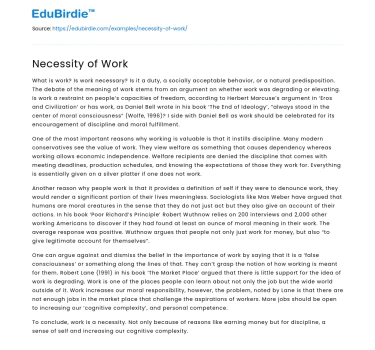What is work? Is work necessary? Is it a duty, a socially acceptable behavior, or a natural predisposition. The debate of the meaning of work stems from an argument on whether work was degrading or elevating. Is work a restraint on people’s capacities of freedom, according to Herbert Marcuse’s argument in ‘Eros and Civilization’ or has work, as Daniel Bell wrote in his book ‘The End of Ideology’, “always stood in the center of moral consciousness” (Wolfe, 1996)? I side with Daniel Bell as work should be celebrated for its encouragement of discipline and moral fulfillment.
One of the most important reasons why working is valuable is that it instills discipline. Many modern conservatives see the value of work. They view welfare as something that causes dependency whereas working allows economic independence. Welfare recipients are denied the discipline that comes with meeting deadlines, production schedules, and knowing the expectations of those they work for. Everything is essentially given on a silver platter if one does not work.
Another reason why people work is that it provides a definition of self if they were to denounce work, they would render a significant portion of their lives meaningless. Sociologists like Max Weber have argued that humans are moral creatures in the sense that they do not just act but they also give an account of their actions. In his book ‘Poor Richard’s Principle’ Robert Wuthnow relies on 200 interviews and 2,000 other working Americans to discover if they had found at least an ounce of moral meaning in their work. The average response was positive. Wuthnow argues that people not only just work for money, but also “to give legitimate account for themselves”.
One can argue against and dismiss the belief in the importance of work by saying that it is a ‘false consciousness’ or something along the lines of that. They can’t grasp the notion of how working is meant for them. Robert Lane (1991) in his book ‘The Market Place’ argued that there is little support for the idea of work is degrading. Work is one of the places people can learn about not only the job but the wide world outside of it. Work increases our moral responsibility, however, the problem, noted by Lane is that there are not enough jobs in the market place that challenge the aspirations of workers. More jobs should be open to increasing our ‘cognitive complexity’, and personal competence.
To conclude, work is a necessity. Not only because of reasons like earning money but for discipline, a sense of self and increasing our cognitive complexity. Remember, if you haven’t worked for something, you haven’t earned it.






 Stuck on your essay?
Stuck on your essay?

